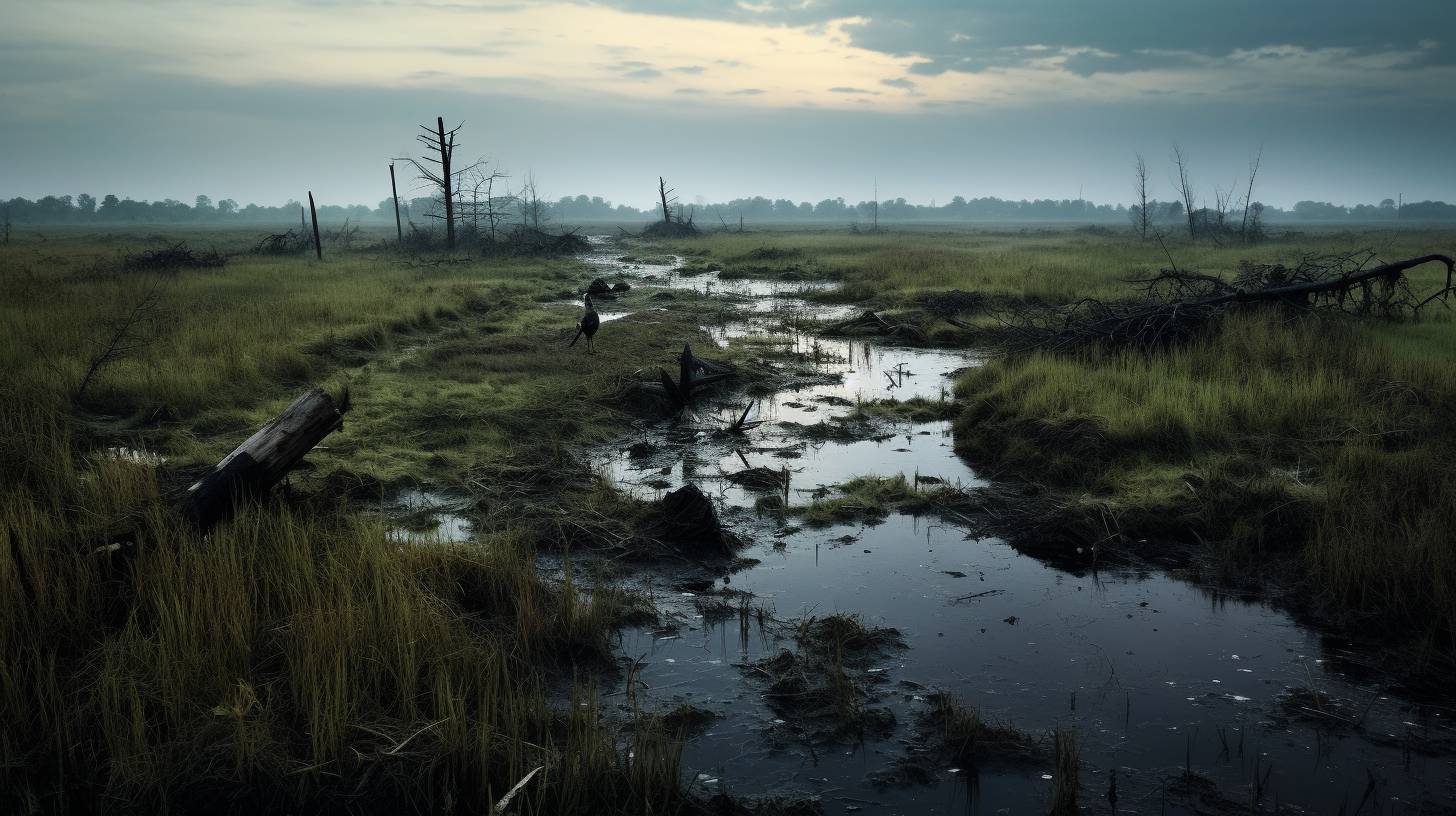As the sun sets on mankind’s once flourishing civilizations, the marshes speak in hushed tones—reciting a eulogy for the world we once knew. The Last Whispers of the Marsh is not just a chronicle of loss; it’s a testament to nature’s indomitable will to claim what was always hers, and the twilight songs of creatures that now reign over humanity’s remains.
The Understated Might of Marshlands
The marsh awakens, spreading its tendrils through the remnants of our sunken cities. The once-prevalent hum of human activity has been replaced by the subtle bustle of wetland life. Our monuments, engineered with the hubris of permanence, succumb to the relentless creep of the marsh, their facades tattooed with the scars of nature’s conquest.
‘For what’s built by man, the marsh does not falter. It crawls, it seeps, it engulfs and alters.’ — an anonymous poet of the end-times
Birds that were thought to be lost to the annals of extinction have found sanctuary amidst the rusting beams and crumbling concrete. They sing a haunting melody that speaks of resilience amidst ruin. In the encroaching wetlands, their voices carry the weight of an era that is slipping away with the tide.
The Eerie Silence of the Lost
The waters which once gave life now whisper secrets of a silent world. The homes of our ancestors, mere ghostly shells, play host to the specters of memories and echo with the laughter and cries that once resonated within their walls. These abandoned dwellings tell tales of escape, of surrender to the rising tides and the slow yet unstoppable force of nature reclaiming what was promised.
Research vessels, sent to study the acceleration of these ‘inundation events’, now lie anchored, wavering lonely on the new marshland horizon. The last of our scientists send back ominous data as they stand aboard these modern-day arks, a sobering reminder of the ultimate folly of human endeavors.
The Fall of Our Greenspaces
Even our attempts to create ‘sustainable’ green spaces have fallen before the might of the marsh. Solar parklands intended to power our final bastions flicker and fade as they are swallowed by the mud. Beneath the murky waters, fragments of eco-utopias lie as a submerged mosaic of our lost dreams—the irony of sustainability vanishing into unsustainable decay.
Meanwhile, amphibians and marsh plants specialize in this anoxic world, thriving where humans can no longer tread. Their existence mocks our failed green technology, proving that true sustainability lies not in human hands but in the relentless, adaptive cycle of the wild.
The Marsh’s Hushed Prophecy
In the silence of these wetlands lies a prophecy—a final warning to those who will listen. The marsh does not speak of hope, for it has none to offer. Instead, it mutters a continual reminder of impermanence.
Yet, these environments also reveal stories of new beginnings. Each squelch of mud underfoot, each rustling reed in the wind, tells of life that continues amidst the despair. Creatures crafted by evolution to withstand these soggy realms move in silence, their presence unnoticed but vital to the marsh’s whispered tales.
Conclusion: Echoes of a Warning
We end on the notes of the wetland’s symphony—a complex performance of loss and revival, a paradox of ending and enduring. Our place in this orchestra has been relegated to the background, the once dominant human narrative now a subdued, fading whisper amongst the loud crescendos of nature’s reclaiming force.
Like a slow-expanding dirge, The Last Whispers of the Marsh signals the irrevocable change in our world’s anthem. Here, where the last remnants of humanity’s reign wade in shadowed waters, we learn that even in dystopia, there is life echoing in quiet defiance.
